Starfield crafting and research guide: how to unlock and make new items
Advance the field of science so that you can make your guns shoot better.
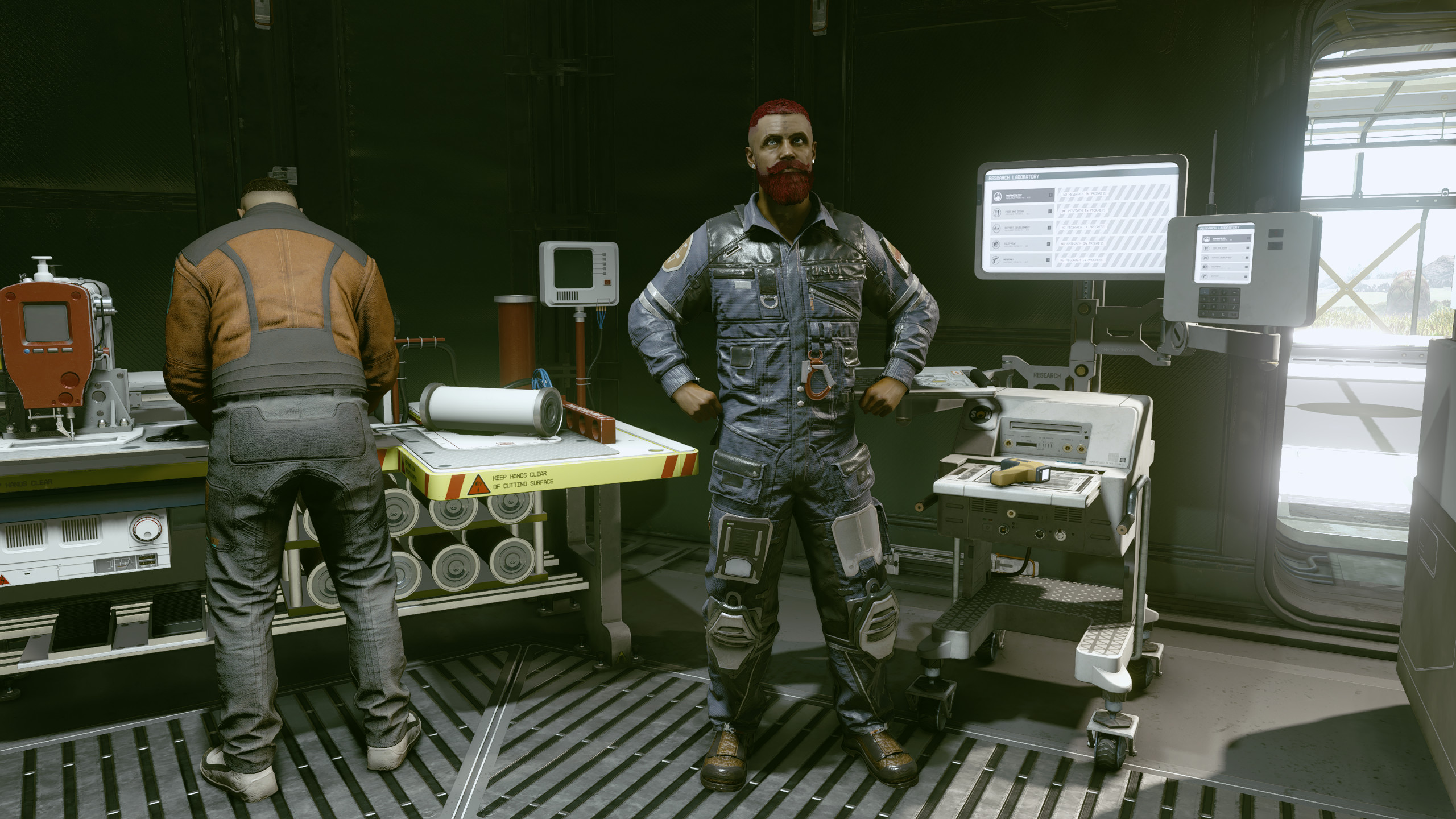
Crafting and research are key to your adventure in Starfield, and though they can be a little overwhelming, once you understand how it all works they're pretty simple systems. By doing research to unlock new items and mods, and then crafting them using resources collected out in space, you can gain a real edge over all the Spacers and other dangers in the game.
The research lab
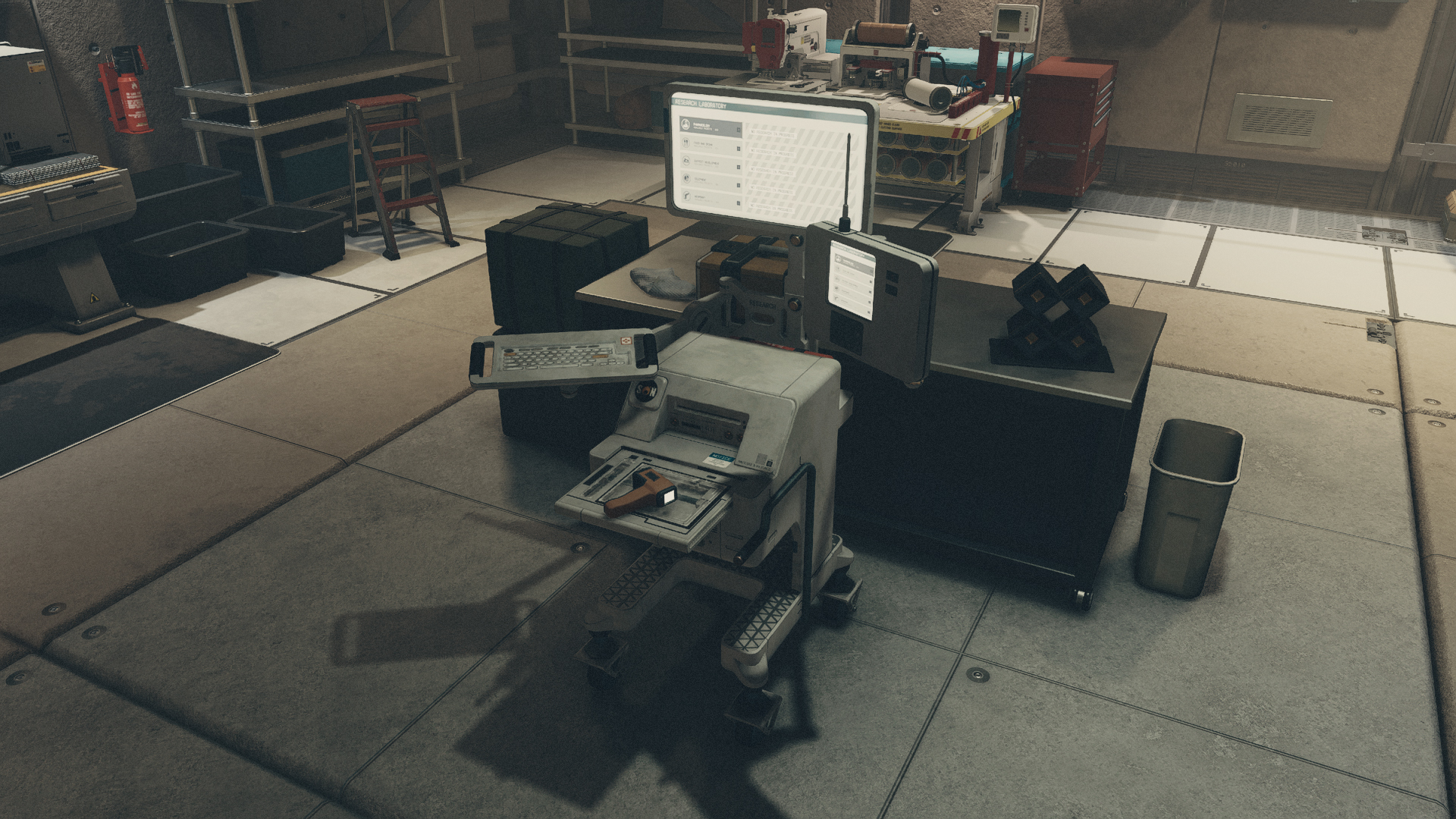
To get started doing research in Starfield, the first step is to find a research lab. You'll find one of these little computer consoles in the spaceship you start with, but I find the best place to go is the Lodge in New Atlantis. You can fast travel there with ease, and there's a lovely setup for all your research and crafting needs in the basement.
Alternatively, you might want to build yourself a little den of science at one of your outposts—check out our Starfield outpost guide for more info on that.
Research categories
Pharmacology
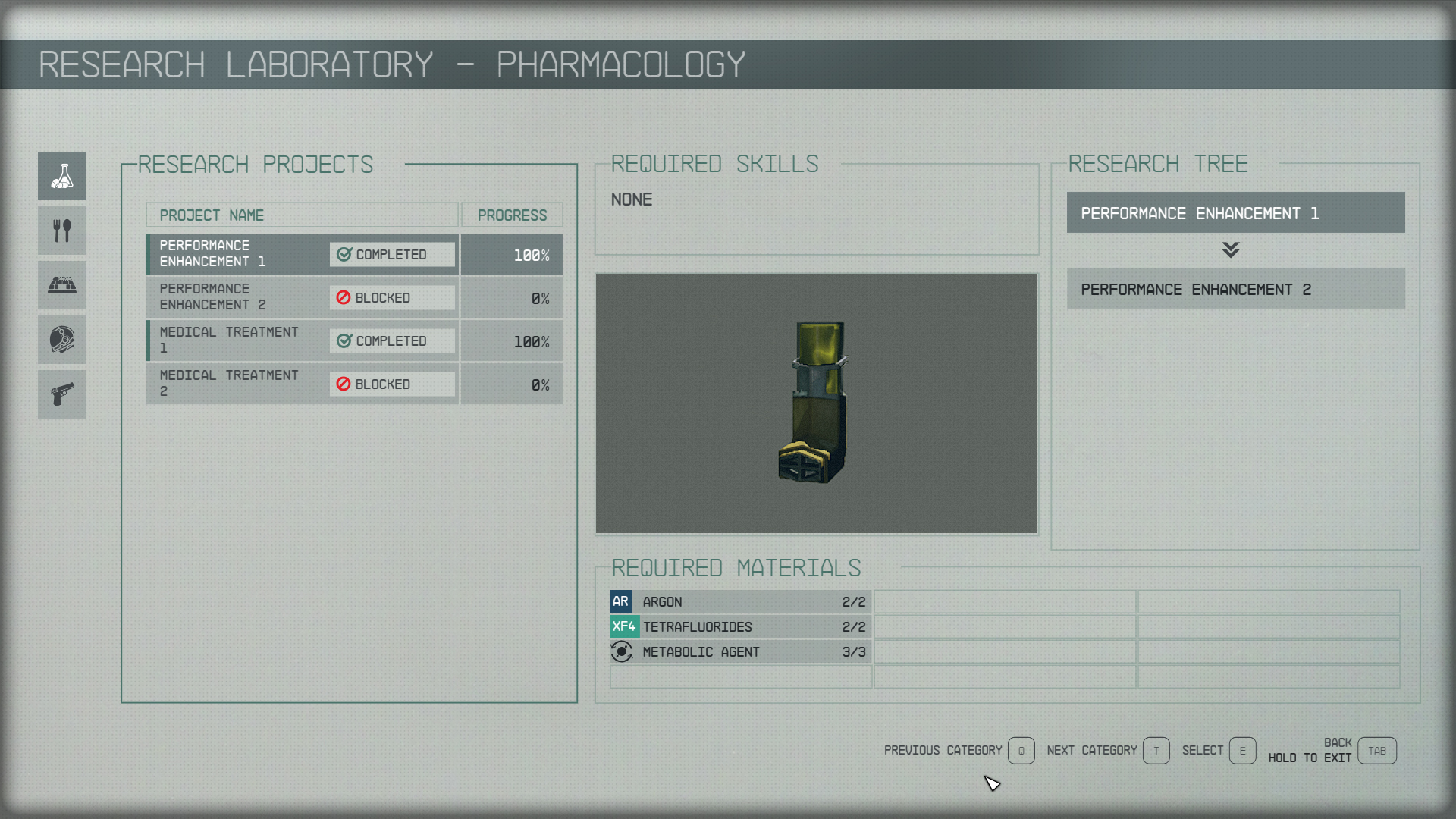
Learn how to make new drugs and medical supplies. Very useful if you love stacking buffs on yourself.
Food and Drink
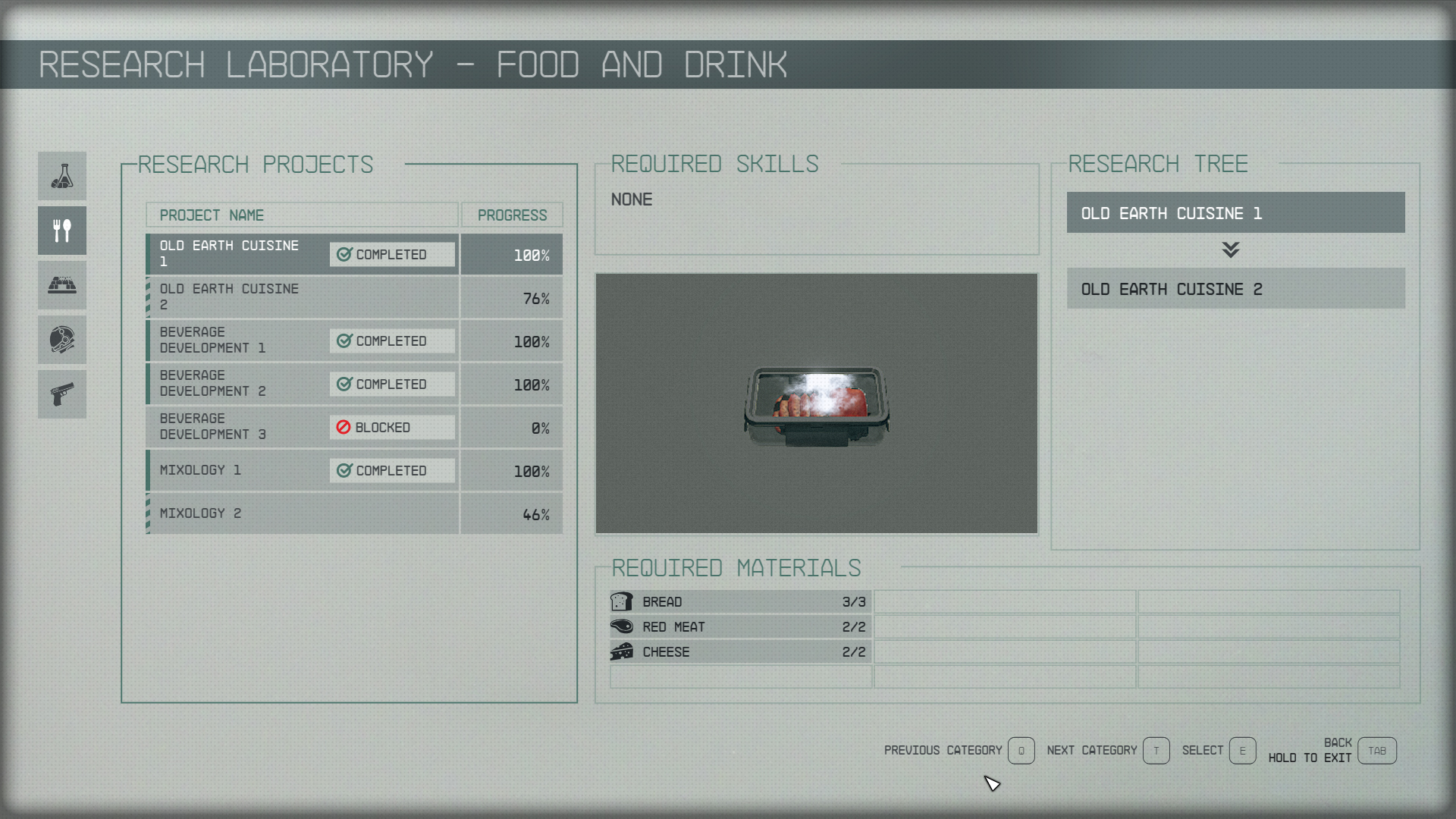
Learn how to make meals that can restore health and provide other buffs. I've found this one the least useful, as there are usually better aid items to be found in Pharmacology—but then I do have Alien DNA which makes food less effective for me, so maybe it's just me…
Outpost Development
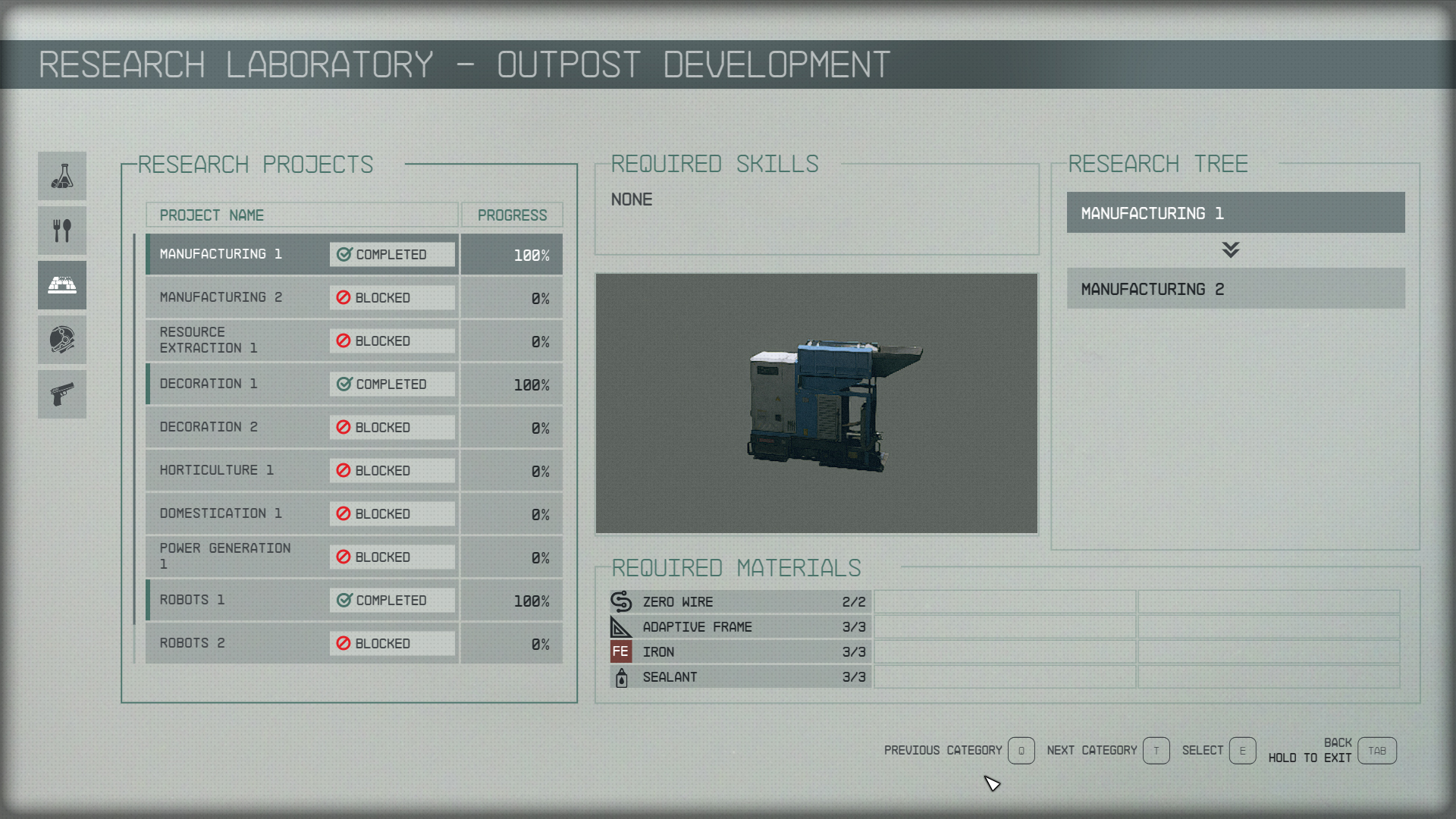
Learn how to make new buildings that can be placed at your outposts. Very useful if you intend to go big on building bases. Pick projects carefully depending on the kind of building you like to do—for example, some buildings are purely cosmetic, while others have specific useful functions.
Equipment
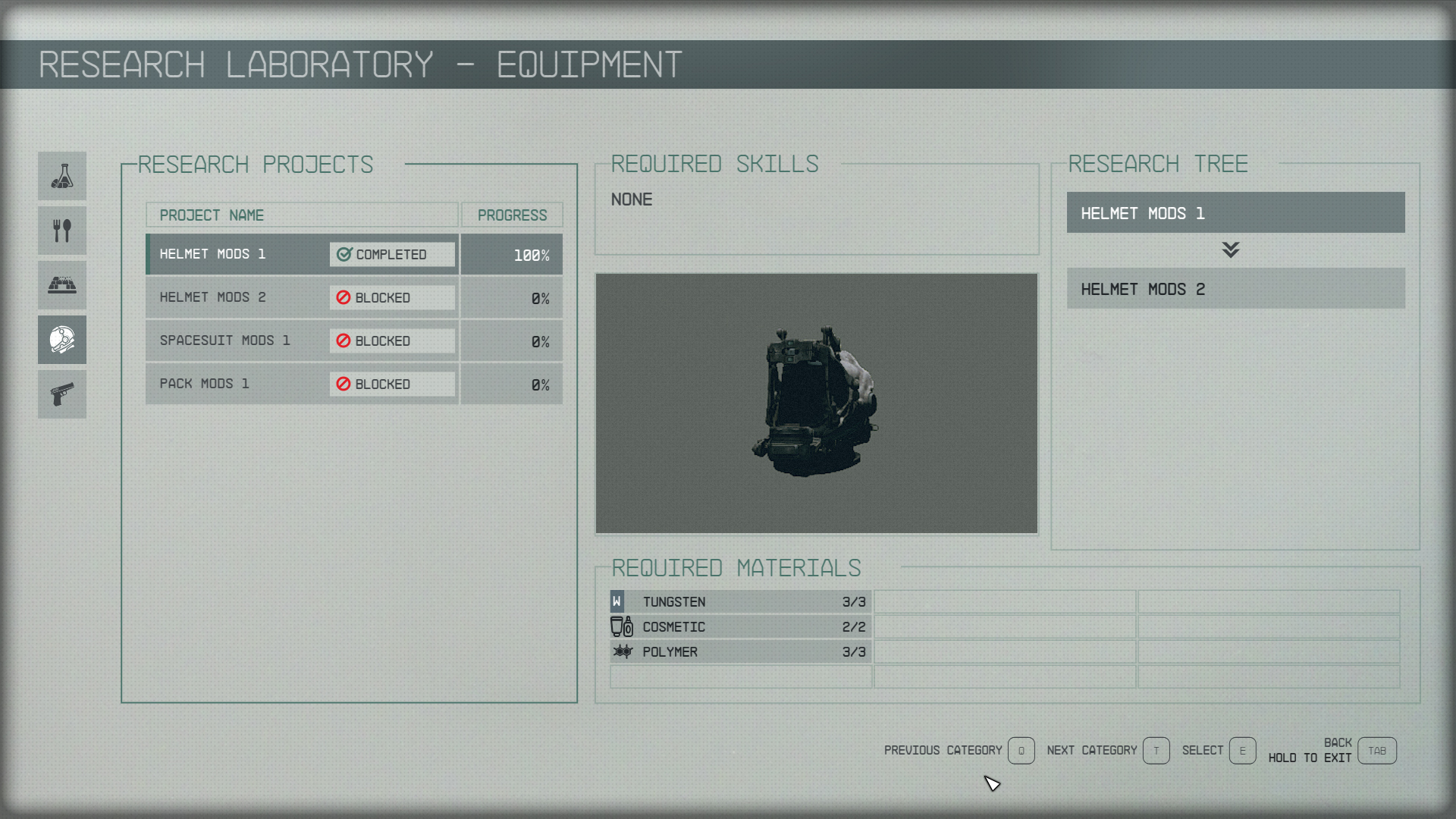
Learn how to make new upgrade mods for your helmet, spacesuit, and boost pack. These are handy for increasing things like your oxygen and boost pack capabilities, but you'll find Weaponry has a bigger impact on what you can get away with in combat.
The biggest gaming news, reviews and hardware deals
Keep up to date with the most important stories and the best deals, as picked by the PC Gamer team.
Weaponry
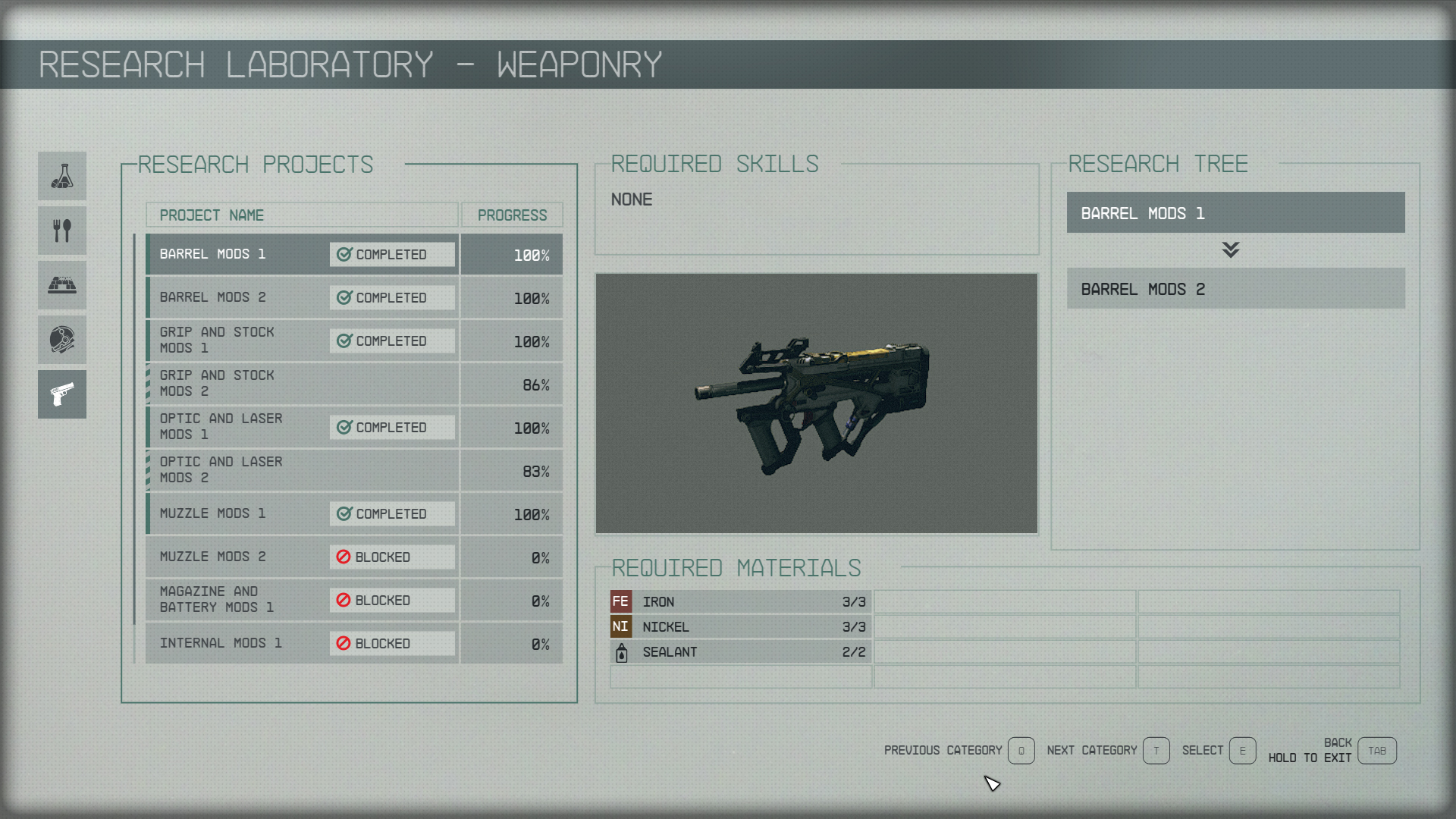
Learn how to make new upgrade mods for your guns. Easily the most important one, I've found—you'll find yourself in gunfights all the time, and mods will enable you not only to make your weapons more powerful, but also tweak them to your preferred playstyle with things like scopes and silencers.
Click through to one of these categories, and you'll discover a list of projects ready to be researched. Each covers multiple new items—Barrel Mods I under Weaponry, for example, unlocks new barrel mod options for all the different guns in the game.
How to research
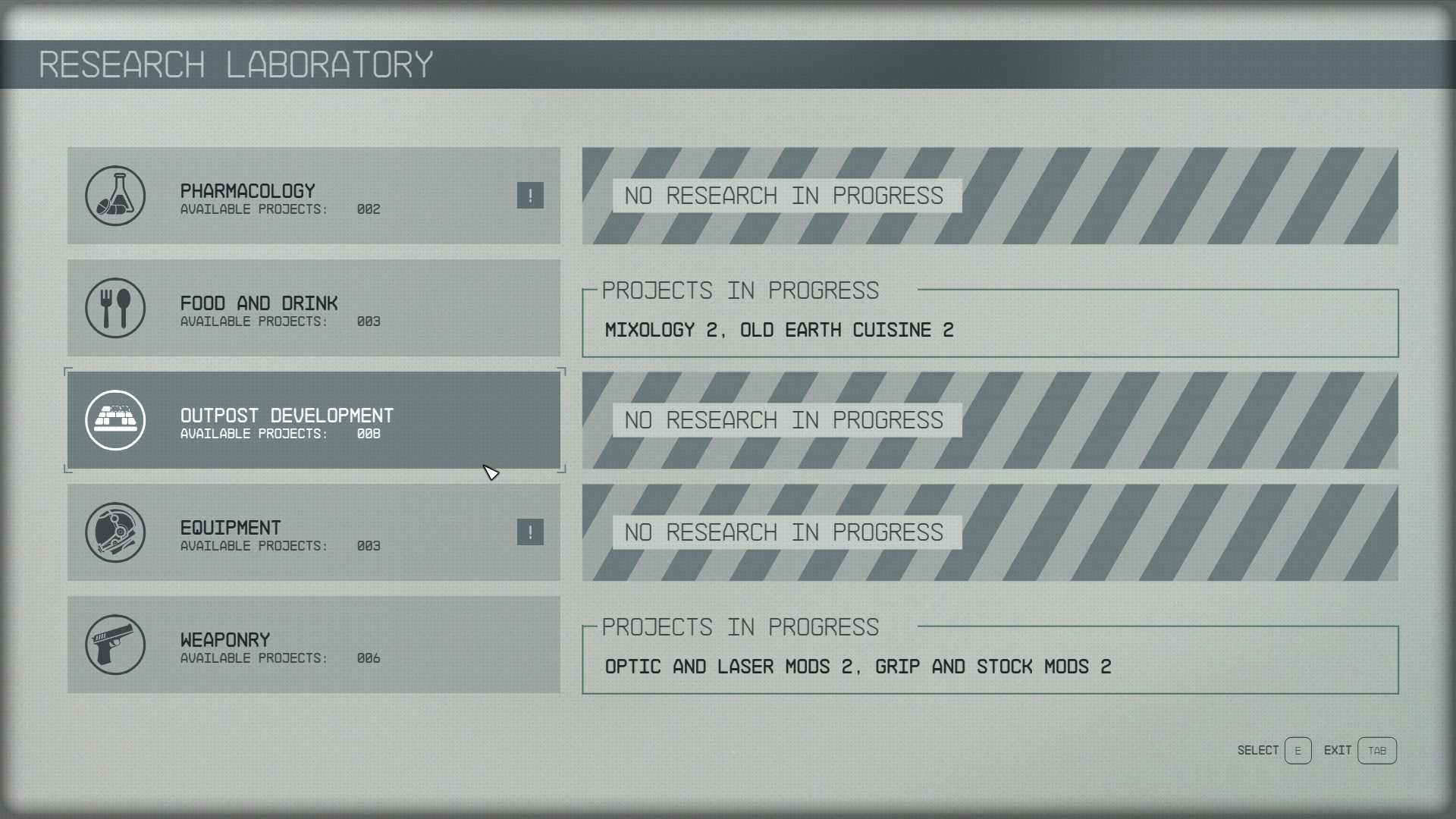

Starfield guide: Our hub of advice
Starfield console commands: Every cheat you need
Starfield mods: Space is your sandbox
High-Tensile Spidroin: Rare crafting resource
Starfield companions: All your recruitable crew
Starfield romance options: Space dating
To research a project within a category, you just need to click on it and feed the relevant resources into it from your inventory. Helmet Mods 1, for example, requires three Tungsten, two Cosmetic, and three Polymer. Pay the cost, and the project is complete—you don't have to wait for it to finish or anything like that.
Sometimes you won't even have to pay the full cost. When you complete a particular resource requirement, there's a chance of receiving an "overflow" bonus, which automatically fills out some of the other resource requirements of the project for free. Using that Helmet Mods 1 example, if you handed over the three Tungsten, and got an overflow, it might give you the two Cosmetic for free. This means that even if you don't have all the resources you need to complete a project, as long as you have enough for one or two steps, it may be worth feeding them in anyway for a chance at not actually needing the bits you're missing after all.
Research skills
Past the initial set, most research projects are gated by your Starfield skills. Unfortunately, unlocking them isn't as easy as just dumping points in one science-based skill—each category of research demands a different category of skill, and progressing in them all can mean investing a lot of points, especially as you need to rank them up further to do more demanding projects.
The skills relevant to research are the following:
Chemistry (Science)
Determines what Pharmacology projects you can complete. It may take you a while to get this one—it requires eight points invested in Science skills before you can even start putting points in Chemistry.
Gastronomy (Social)
Determines what Food & Drink projects you can complete. This is an easy one to get—it's available without any other investment in Social skills, and many backgrounds start with it already picked. It's annoying, however, that it isn't in the Science tree, because it means that points invested here aren't getting you any closer to other relevant research and crafting skills.
Outpost Engineering (Science)
Determines what Outpost Development projects you can complete. Like Chemistry, this one requires eight points in Science, so if building bases is your main focus in Starfield, my advice is to invest early and often in this skill category.
Spacesuit Design (Science)
Determines what Equipment projects you can complete. Only four points in Science skills are needed to get to this one, so it's a good one to grab early on.
Weapon Engineering (Science)
Determines what Weaponry projects you can complete. Like Spacesuit Design, it's only four points deep in the Science tree—for the impact it'll have on combat, that makes it well worth taking.
Research Methods (Science)
While this skill doesn't gate any of your research projects, it's still worth considering because it makes them cheaper. If you're struggling with finding enough resources for your projects, it's a good pick, but only if you're happy to rank it up to max ASAP—the early bonuses are quite small, but by rank four you're spending 60% less resources and getting overflow bonuses twice as often.
The only other thing to note with these skills is that levelling up in Starfield isn't as simple as just assigning points—once you have your first rank in a skill, you have to complete a challenge to unlock the ability to advance to the next rank. In the case of these skills, however, that usually just means crafting a certain amount of items, so as long as you're actually making the stuff your research is unlocking, you should be able to keep up. Speaking of crafting…
Starfield crafting guide
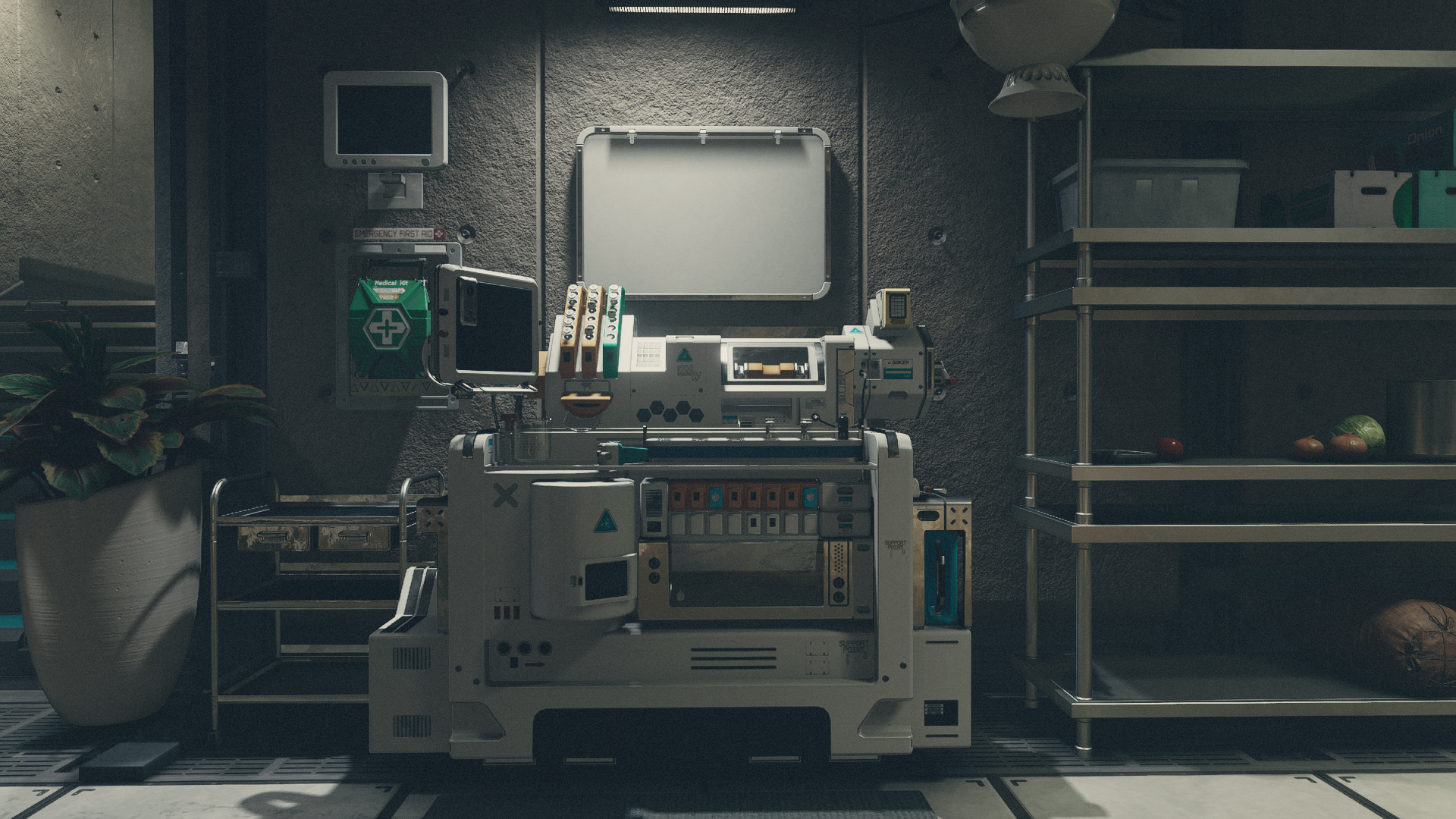
Once you've researched some projects, it's time to turn theory into action and actually craft some of the goodies you've unlocked. Again, the perfect place to do this is the Lodge, because it has all the crafting stations ready for you in one room in the basement, and you can just fast travel there whenever you like. Some ships do have crafting stations—the starting ship has a Galley where you can make food, for example—but I'm yet to find one with the complete suite, and though you can build crafting stations at your outpost for a more home-made feel, it can (ironically) take a while to unlock them all and gather the resources needed to make them.
Speaking of outposts—though outpost buildings are made using resources, they're not actually crafted at a crafting station. You just plonk them down in build mode when you're managing your outpost.
The crafting stations at your disposal include:
Cooking Station (or Galley)
Used to craft food and drink. One thing to be careful of at this station is that many meals use as their ingredients other items that can be eaten or drunk in their own right. An Alien Sandwich, for example, requires bread, but you can just eat bread on its own if you prefer, so make sure you're not cooking away anything you'd rather munch on raw. Or put on display at your outpost, I suppose.
Industrial Workbench
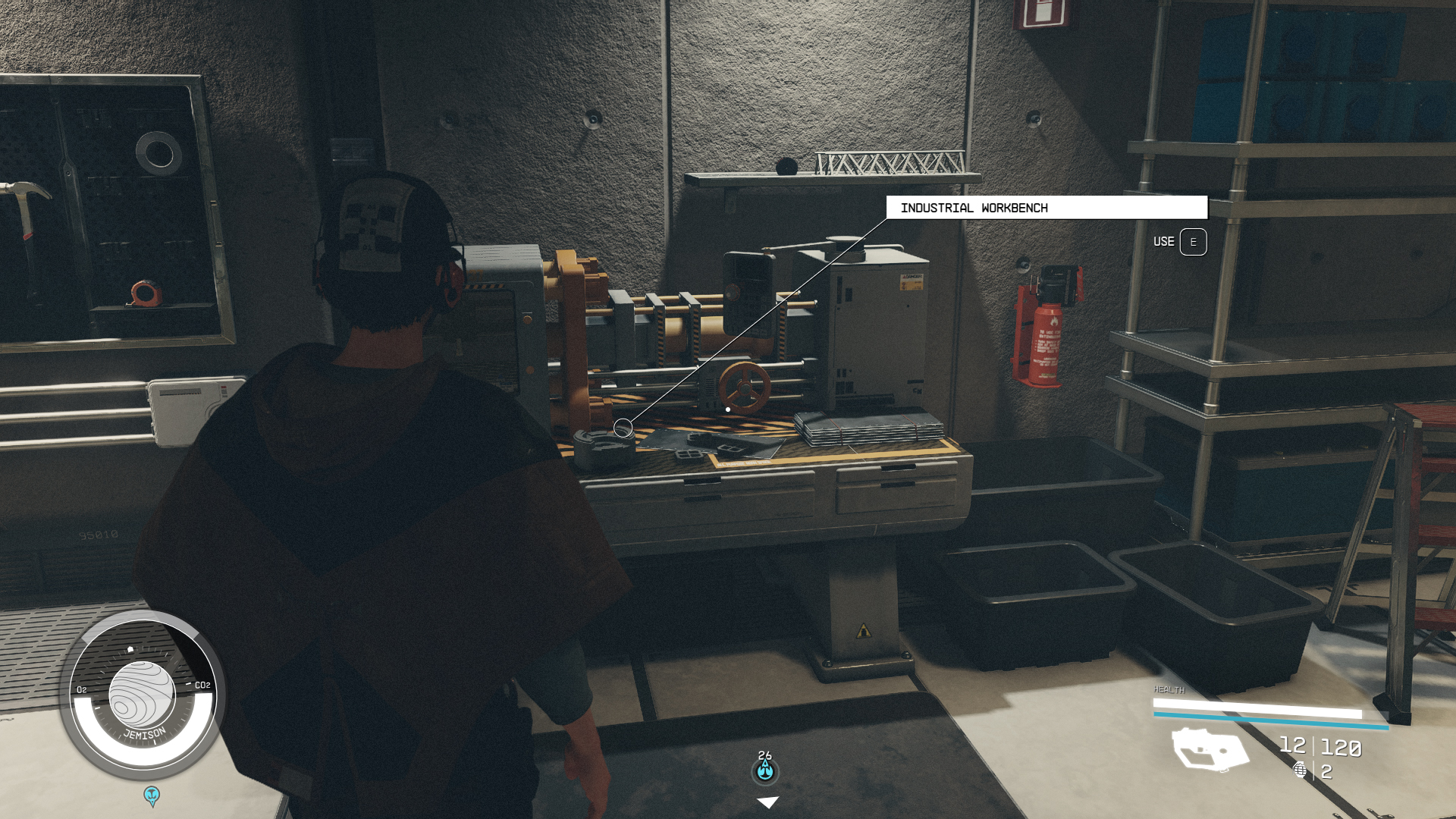
Used to turn raw resources like metals into more specific items such as wire and building frames, which can then be used for research projects, other crafting, or making outpost buildings. It can be a little confusing to know what you need from here—my advice is to only make stuff once you know exactly what you need, rather than filling your inventory with Adaptive Frames and then discovering you have no use for them.
Pharmaceutical Lab
Used to craft drugs and medical supplies, for keeping yourself in tip-top shape—or better than tip-top, if you indulge in performance-enhancers.
Spacesuit Workbench
Used to craft and install mods for your spacesuit, helmet, and boost pack. Simply click on the relevant object, and you'll be taken to a list of different mod types that can be applied to it—from there, you can make and apply them.
Weapons Workbench
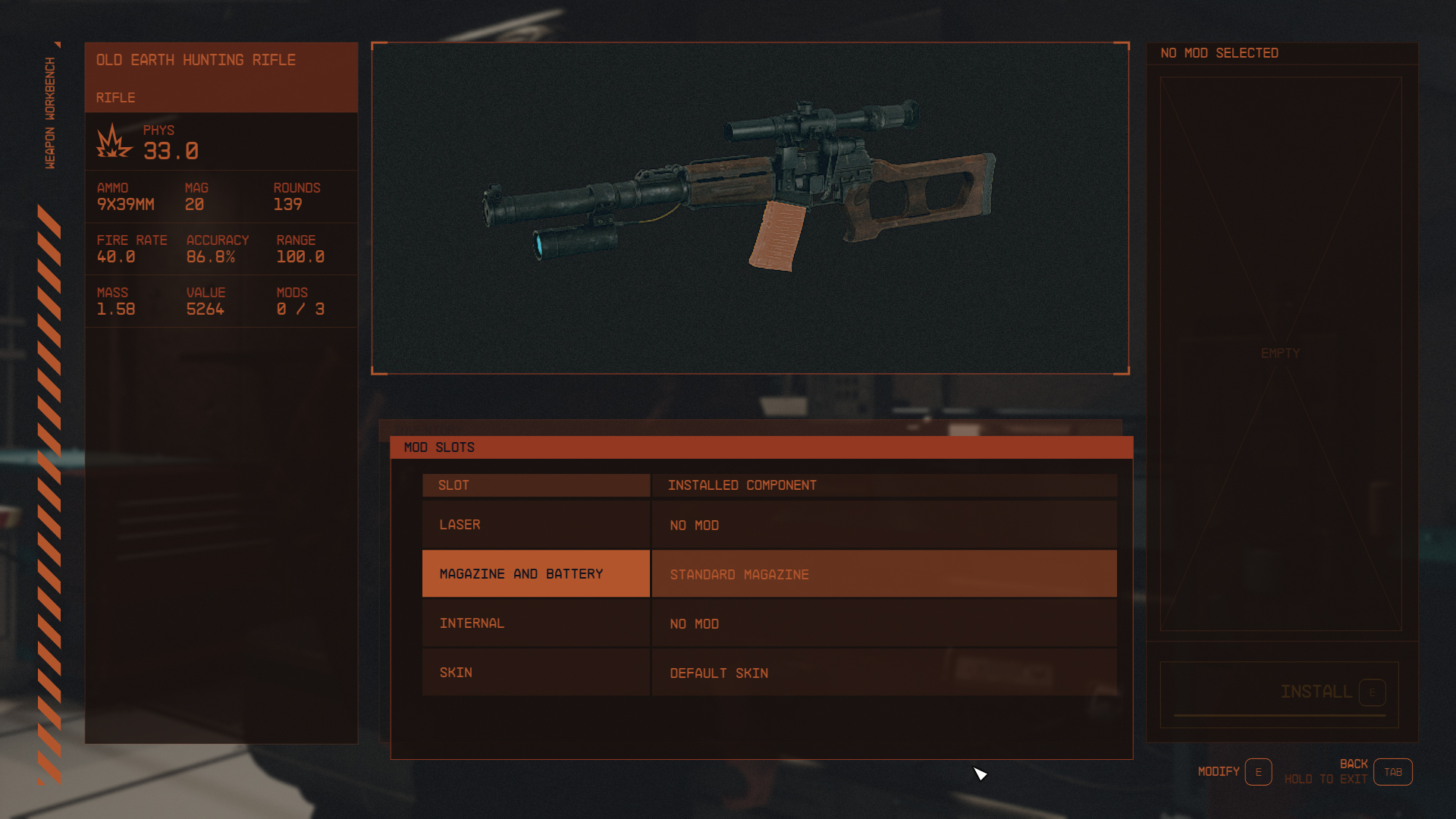
Used to craft and install mods for your guns. Just like spacesuit modding, all you need to do is click on a gun, pick a category for that gun (such as barrel, scope, or stock), and you'll be presented with the relevant options available for crafting. Keep in mind that different guns have different mod slots, and different mods that can be placed in those slots. Not every gun can have a laser sight, for example, and you can't change an Old Earth Hunting Rifle's stock.

Formerly the editor of PC Gamer magazine (and the dearly departed GamesMaster), Robin combines years of experience in games journalism with a lifelong love of PC gaming. First hypnotised by the light of the monitor as he muddled through Simon the Sorcerer on his uncle’s machine, he’s been a devotee ever since, devouring any RPG or strategy game to stumble into his path. Now he's channelling that devotion into filling this lovely website with features, news, reviews, and all of his hottest takes.

